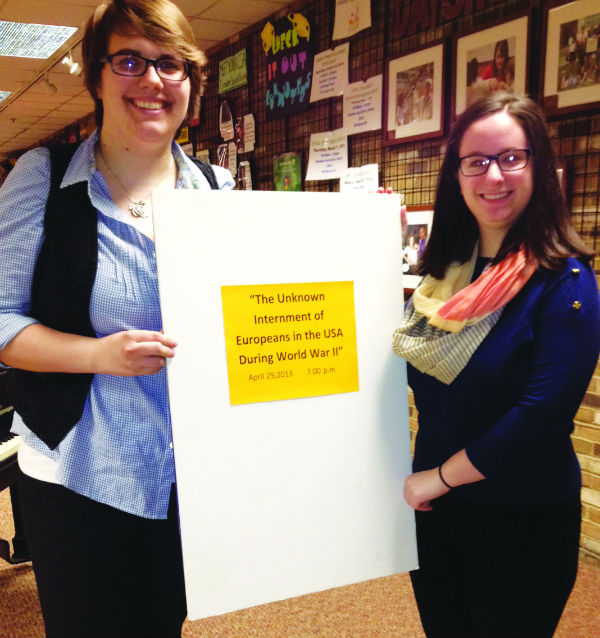“Guten abend,” Dr. Stephen Hollander, professor of German, greeted the room. There was quiet chattering from audience members who were clearly familiar with the German language. While they waited for speaker Mr. Eberhard Fuhr, attendees could visit the informational posters plastered around the room full of information on noteworthy Germans.
Fuhr was born in Germany, but immigrated to Cincinnati with his family at the age of three. Fuhr went to a fully integrated public high school, where he lettered in football and baseball.
Fuhr explained that many people know about how the Europeans locked up their own citizens during World War II, but rarely does anyone discuss the American people that were locked in camps on American soil.
This was the result of the “Alien Registration Act,” which required any immigrant to register if they were 14 years of age or older. A registered alien was given a passport that was to be carried at all times, was not allowed to posses any camera or weapon, and was forbidden to go on a military base or airplane.
Fuhr’s parents were sent to the internment camp, but because his younger brother was only 12, he was given the option of going to an orphanage or the camp with his mother. Rather than separate the family, his brother chose to go to the camp. Fuhr and his older brother stayed at home and did their best to keep the house together.
“I don’t want to be perceived as a victim. I may have been a target, but I will not be seen as a victim,” Fuhr said to a wide-eyed audience.
Six weeks before he graduated from high school, he was arrested and taken from class in handcuffs. He had a trial at the federal building—one without any witnesses or lawyer — and was given a chance to go home to collect two days worth of clothes before being sent to Crystal City, Texas.
Crystal City was designed to be a family camp during WWII. They knew it would exist long after the war, so it was designed to be an irrigation source once there was no longer a use for internment camp. Thousands of Japanese and German Americans were relocated to the camp, usually without reason or warning.
In the camp, they did their best to live like normal humans. There was a public school accredited by the State of Texas, along with a Lutheran church and a public pool. They danced to John Miller and Arthur Shaw.
There was always work to be done. Most of the internment camp was run by inmates, save for the hospital, which was run by the US Public Health Service.
Fuhr was part of the “Ice Crew,” which paid 10 cents an hour. Because it required his driving the ice truck to each internee’s house, he was probably the only inmate that learned how to drive while interned and even has a driver’s license granted from the camp.
Fuhr assured the audience that while he was placed in the camp unconstitutionally, and it defied the code set by the Geneva Convention, he did live in sanitary conditions and received humane treatment.
“It was the monotony that would kill you,” said Fuhr.
Once the war was over, President Truman ordered all internees to be deported back to their home country. They were sent to Ellis Island to wait and were told they were not entitled to a hearing. Fortunately, Senator William Langer stepped in and gave each person a hearing and hope.
Once Fuhr was released to go, he wasted no time getting off the Island and took the next ferry out, which left in 20 minutes. Worried that they would change their mind, he found a room to rent with the help of his wife, who he had met in the camp but had been released prior.
He continued school and went through the ROTC, waiting for the end of the seven years that would allow him to be naturalized to America.
“There comes a time when you say to yourself—well, I’m here, and there’s not a thing I can do about it. You project yourself beyond what you would do after the war,” said Fuhr.
This German-American Kulturabend was sponsored by the Baldwin Wallace German Club and the Department of Foreign Languages & Literatures.
Firsthand Account of WWII US Internment Camps
A. Paige Greene, Contributing Writer
May 3, 2013
Categories:
Story continues below advertisement
0
Donate to The Exponent
$325
$5000
Contributed
Our Goal
The Exponent is looking for financial contributions to support our staff and our newsroom in producing high-quality, well-reported and accurate journalism. Thank you for taking the time to consider supporting our student journalists.
More to Discover






























